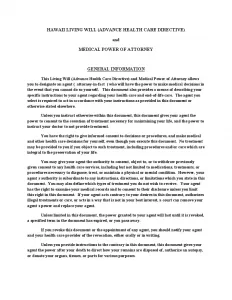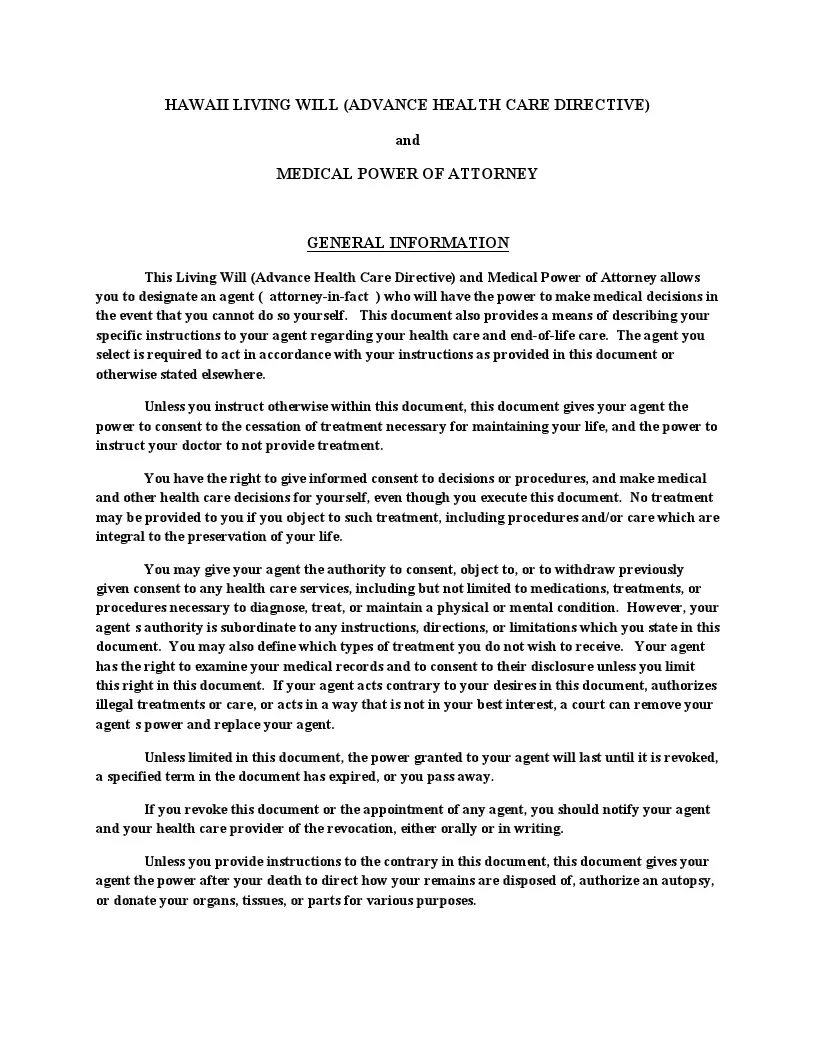Free Hawaii Living Will Form
A living will in Hawaii is a legal document that allows you to express your wishes about medical treatment in situations where you are unable to communicate due to illness or incapacity. A Hawaii living will is particularly crucial in guiding healthcare providers and your family members in making decisions that align with your preferences regarding life-sustaining treatments.
In your living will, you can specify which medical procedures you want to be withheld or withdrawn if they only prolong the dying process and you are in a certain medical condition, such as a terminal illness or permanent unconsciousness. This document is combined with a Medical Power of Attorney or a broader Advance Health Care Directive, which appoints an agent to make health care decisions on your behalf if you cannot do so.
Signing Requirements and Laws
In Hawaii, the requirements and laws governing the creation and execution of a living will, also known as an Advance Healthcare Directive, are outlined in the Hawaii Revised Statutes (HRS) under Chapter 327E, specifically the Uniform Health-Care Decisions Act.
Under HRS §327E-3, an advance directive must be in writing and signed by the principal (the person making the directive) or by another person in the principal’s presence and at the principal’s direction if the principal is unable to sign. The signing of the directive must be witnessed by two individuals who meet the following criteria:
- They must be adults.
- They should not be the health care agent appointed in the directive.
- You should not be a healthcare provider or employee of a health care provider directly responsible for the principal’s care at the time of execution.
At least one witness must be someone not related to the principal by blood, marriage, or adoption and would not be entitled to any portion of the principal’s estate upon their death.
Alternatively, the directive can be acknowledged before a notary public. This flexibility ensures that individuals with difficulty finding suitable witnesses can still execute a valid document.
The principal may revoke the directive at any time, as stated in HRS §327E-4, by signing and dated writing, physically canceling or destroying the document, or communicating their intent to revoke it in any manner. Complying with these legal requirements ensures that the Advance Health Care Directive is valid and enforceable. If the directive is not properly executed, health care providers may not honor it, which could result in unwanted medical treatments or interventions.
Hawaii Living Will Form Details
| Document Name | Hawaii Living Will Form |
| State Form Name | Hawaii Advance Health Care Directive |
| Signing Requirements | Two Witnesses or Notary Public |
| Validity Requirements | Section 327E-3 of the Hawaii Revised Statutes |
| Powers Limitation | Section 327E-5 |
| State Laws: Hawaii Revised Statutes, Sections 327E-1 to 327E-16 | |

Steps to Fill Out the Form
Filling out a Hawaii living will form is essential in managing your future health care decisions. This document not only designates an agent to make decisions when you cannot but also lays out your wishes regarding treatments and end-of-life care. Here’s how to complete the form to ensure your preferences are legally documented and respected.
1. Provide Personal Information
Start by entering your full name and complete address. This basic information identifies you as the principal of the directive.
2. Appoint a Health Care Agent
Designate a trustworthy individual as your health care agent who will make decisions according to your wishes if you are incapacitated. Include their full name, relationship to you, contact details, and address. If necessary, appoint an alternate agent by providing the same details for them.
3. Individual Instructions for Health Care
Make specific choices about your health care in situations where you might be near death, in a coma, or otherwise unable to make decisions:
- Decide whether you want your life to be prolonged.
- Specify if you want to receive artificial nutrition and hydration.
- State your preferences for pain relief.
- Include any ethical, religious, or spiritual instructions that may affect your care.
By following these steps, you can be confident that your health care preferences will be understood and respected when you cannot voice them yourself.
4. Additional Health Care Instructions
You can add more detailed instructions if the standard options do not fully represent your wishes. This could include decisions about hospice care, whether you wish to donate your organs or other specific medical treatments.
5. Sign and Date the Form
Once all sections are completed to your satisfaction, sign and date the form to make it legally binding. Make sure this is done in the presence of the required witnesses or a notary public, depending on your chosen validation method.
6. Witness or Notary Validation
Choose between having two witnesses or a notary public certify your signature. Witnesses must not be your health care agent, provider, or financially connected to you. If using a notary, ensure they correctly complete their section of the form.
7. Distribute Copies
Provide copies of the completed directive to your health care agent, alternate agents, primary physician, and family members or friends who should be aware of your wishes. Keeping a copy in an easily accessible place at home is also recommended.

Below are various other Hawaii templates completed by our users. Try our simple builder to customize these forms to your preferences.
